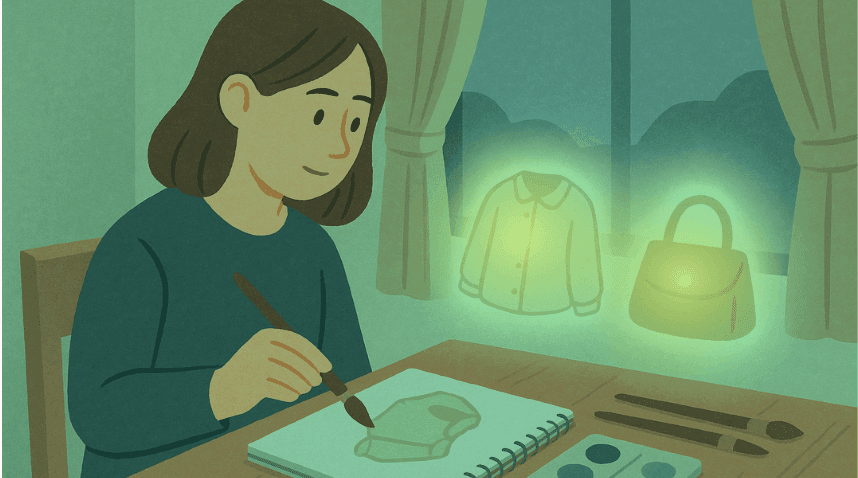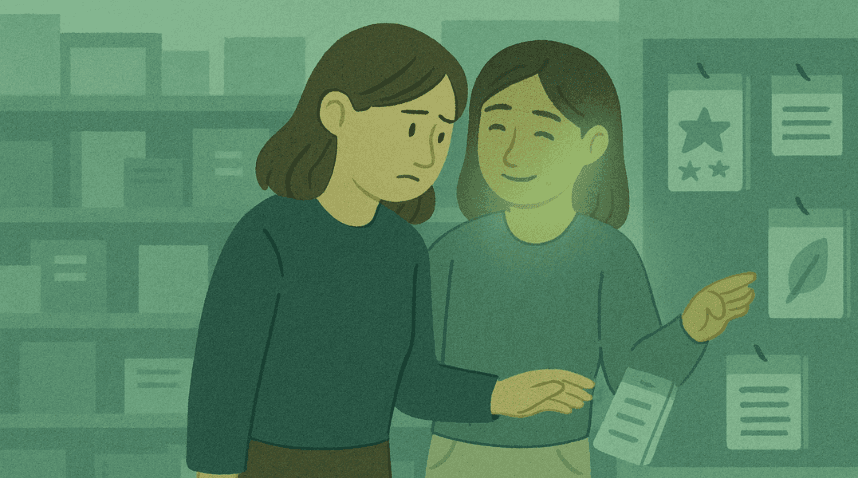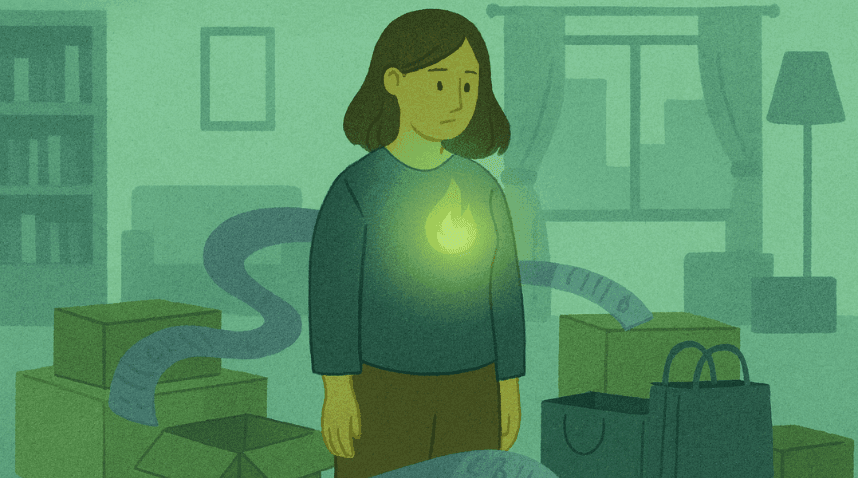TLDR: Ever bought something you had to have, only for the joy to fade right after? Ophelia reflects on her struggles with impulse spending and how Buddhist mindfulness has slowly helped her make more intentional choices. Spoiler: She still wants things, but now she pauses and listens to her wise mind first.
Impulse spending. We’ve all been there, haven’t we? That irresistible urge to buy something on the spot, believing in that moment it’s exactly what we need to plug that blackhole within our hearts.
The Traps of Greed
Remember the last time you scroll mindlessly to a sponsored Instagram post, you notice something novel/cute/pretty/quirky/productive, and feel that little tug? A whisper says you need this <ad product> right now. And you clicked “Shop Now”.
The item that just popped up on your screen promises a better life, a more put-together, more fulfilled version of you. Not just one item, but every item you browse holds endless possibilities. You want that future to happen.
With just a press of “Buy it Now”, Google auto-fills your credit card details and your shipping address because it is such a helpful personal assistant. Within nanoseconds of authorising that transaction, you’ve got mail: Yay! We are preparing your order. Delivery within 3-5 working days. Track your shipment here.
You heaved a sigh of relief. Life can only be better after you receive the parcel. You check the shipment progress in anticipation. Can’t wait for good things to happen.
Or maybe that last time happened within a physical store of a major retailer: you remember seeing “50% off” cards hanging from every other corner.
Everyone else has something in their hands, browsing for more. Unconsciously, you ran your hands through the aisles for something. Anything. You want to be like them. You just got your salary today; you know you can treat yourself for slogging a month at work. You deserve better.
You’d bring that “promise-of-a-better-life” home. Head light, hands full. You feel a flicker of joy.
Within days, sometimes hours, that fickle light fades out like the moment a sparkling wand dies. The exact moment you set the new trophy down, you notice the older purchases still on the coffee table. Shopping bags and cardboard boxes litter the living room. So do your guilt and emptiness.
Then, the next craving would come. You want to experience that joy of waving the sparkly wand of consumerism again. A harmless pen. A sheet of stickers. An inspiring notebook. Another shirt, different in colour than the ones you had. Cleaning supplies. Gradually, the trophy becomes more costly.
That’s the thing with craving, a loose translation of tanha. It never ends. You got some and you want more.
What I’ve described was an older self. She’s still here in her own ways now.
In the Dhammapada (verse 251), the Buddha puts it plainly:
“There is no fire like passion… no river like craving.”
This fire burned through my bank account. This river flooded my apartment with things and left me wondering, why do I keep doing this to myself?

Painting Instead of Possessing
One day, I came across a story on Instagram. A woman who’d paint things she wanted to buy instead of purchasing them. A luxury handbag. A designer couch. A beautiful blouse. She’d record her wants visually, write down why she liked it, and that was it. No checkout. Just observation.
I haven’t tried this hack yet, but something about it stuck with me. It reminded me of what the Buddha often nudged us towards: not rejecting beauty, but seeing their nature clearly. We can appreciate things without clinging. Enjoy presence without owning.
Maybe by capturing beauty on paper, we can acknowledge the desire that arises at that moment and recognise it as distinct from the choice of not acting on greed. We can then let go before the purchase, not just after feeling the regret.

My Online Shopping Cart = My Mirror
Here’s one thing I have been doing. Whenever I see something I want online, I add it to my cart and then I walk away. No checkout. No commitment.
Days pass. A week, sometimes more.
If I return to the cart, I usually find that I may not want those things anymore. The dopamine’s gone. I’ve forgotten why I wanted them in the first place. That pause becomes a mirror. One that shows me the impermanence of my own wanting.
I think of the space as a little mindfulness bell. Every time I feel that surge of “I must have this thing now,* it’s not about saying no. It’s about watching the arising and ceasing of feelings. Letting the wave rise and fall without getting swept up.
Physical Shops = Sensory Overload
Walking into a store? A whole different story. The lights, the smells, the textures of fabric between your fingers, they’re all designed to seduce.
So I came up with a tiny hack. I don’t carry a shopping basket if I’m alone. No trolley either. Just two bare hands.
It might sound silly, but it works to mitigate damage when impulse takes over the steering wheel. If I can’t carry, I can’t buy. This constraint forces me to think, Why do I really want this, or am I just blindly grabbing clutter in another moment of craving?
Choosing with my hands means choosing with my awareness. That’s become a kind of training ground for restraint against the cruising desire.

Bring a Friend, Save Your Wallet
Sometimes, the timeliest wisdom comes from someone beside you. For example, an admirable friend who gently calls out your patterns.
Not long ago, I was eyeing yet another sticker pack. My friend, who’s seen me go through all this before, asked simply, do you really need them, or is it just a passing desire?
She didn’t shame me. Just reminded me to pause. In that moment, the grip of craving loosened. I managed to walk away.
That’s the quiet power of community. A little accountability. A little love.
Mindfulness is not Deprivation
Here’s the thing: the mindfulness practice is not about never buying anything ever again. It’s about asking, Why do I want this? What need is the item trying to fill? And most importantly, will that need be truly satisfied with buying?
Not long ago, after weeks of waiting, I finally bought a set of black fine markers. I’d thought about it. Waited. Reflected. They are inseparable from my sketchbook filled with zentangle patterns doodles.
Now, every time I draw with the fine markers, I feel joy. Not because it’s fancy, but because I chose it with care. It feels earned. Not by money, but by attention. Maybe I’ll start drawing and painting all my desired possessions with these markers.
That’s a shift. I don’t want to live at the mercy of every craving. I want to choose my actions. Live simply. Spend wisely. Cherish what I have. Keep using them, repairing them.
Because in the end, most cravings are just visitors to your mind. And like guests who show up uninvited at your home, if you give them space, attend to their needs with a cup of tea and listen to their musings with presence, they’ll leave you in due time.
Wise Steps:
- Delay checkout by at least seven days so desire meets impermanence, as seen when I left items in my online cart and returned to find I no longer wanted most of them.
- Shop with empty hands so your body sets a boundary, like skipping baskets and trolleys which forced me to ask if I truly needed what I grabbed.
- Invite a mindful friend to be your mirror and agree on a gentle question, as when my friend asked if the sticker pack was a passing desire and the urge eased.


